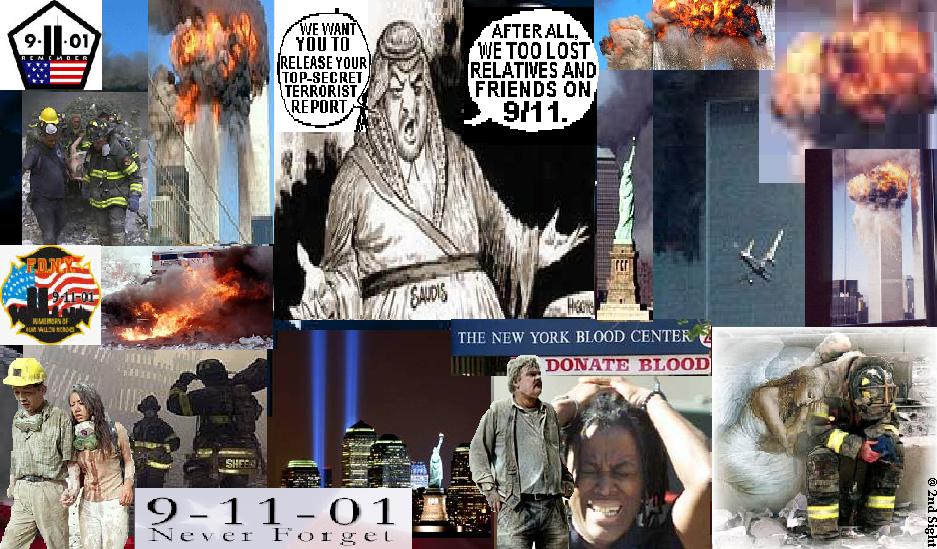|
Revised WTC Freedom Tower Design Unveiled A new design for the Freedom Tower at the World Trade Center
site slopes gracefully into a spire rising 1,776 feet, echoing the Statue of Liberty. Mayor Michael Bloomberg said the tower
- which would be the world's tallest - would "dramatically reclaim a part of the New York City skyline that was lost on 9-11."
What You Think You Know About 9/11 - But Don't
September10, 2003 -- The
Saudi government paid off al-Qaida in exchange for immunity from terror attacks. Saudi princes knew in advance about the 9/11
attacks. Most of the Saudi officials who assisted al-Qaida all died mysteriously soon thereafter. The revelations in Gerald
Posner's new book Why America Slept are an astonishing reminder of just how much we still don't know about 9/11 and its planning.
But there is also plenty that we think we know but don't. I'm not talking about shoddy conspiracy theories (that Jews were
warned not to show up for work at the World Trade Center, for example) believed by the ignorant and the paranoid, but widespread
misconceptions held by everyday Americans. See the full article by David Plotz, in Rense.com, for six of the most common of
these misconceptions.
The backlash against the Bush administration's policies implemented since
9/11 grows as the public comes to believe it has been misled:
Ashcroft Slams Critics as Patriot Act Backlash Grows
America's Interdependence Day
There is a shared global reality and interest.
Parag Khanna proposes to let America, and the world, celebrate it -- on the day after 9/11. -- Open Democracy
Fleeing America
Since 9/11, thousands of New York's Pakistanis
have left the US. Why do they want to escape? -- The Village Voice
News anchor Tom Brokaw summed up in two short sentences
the drastic change in our world-view since September 11th. "Before 9/11," he said,
"it used to be that the possible was unimaginable, and no one believed that anything could happen. Since 9/11,"
he said, "we now believe that the imaginable is the probable: anything can happen." -- Source: The David Letterman Show, 6 February 2003
Congress Releases 9/11 Report
Congress released a report last week on the September 11 terrorist attacks
on the United States. Response to the report continues to reverberate throughout the Arab world.
Particularly controversial are the 28 pages which the Bush administration,
citing national security concerns, has refused to declassify. Paragraph after paragraph, ostensibly dealing with Saudi
Arabia, have been blacked out by government censors on these pages.
Revealed by the remaining text of the report was information that two
of the 9/11 hijackers received money from a student in Los Angeles. The student had links with officials at the Saudi
consulate, and according to the report, had access to seemingly unlimited funding from Saudi Arabia.
The Arab world, despite their differences with Saudi Arabia, has for the most part
responded in united support of the wealthy kingdom that has enjoyed a friendly relationship with the US. But many are saying
that the report plainly exposes Saudi ties to al-Qaida.
9/11 Report Builds Case
By Senator Edwards for the Homeland Intelligence Agency
July 24, 2003 -- Senator
John Edwards (D - North Carolina) cited pre-September 11 intelligence failures last fall when he first called for creation
of a new agency to take over domestic intelligence from the FBI. A member of the intelligence and judiciary committees, he
said efforts by Director Robert Mueller to refocus the bureau's mission after the terrorist attacks on the World Trade Center
and the Pentagon were "too little too late."
The Bush administration fought the congressional review and sanitized
portions of the report, citing ostensible intelligence reasons. "The American people deserve to know the truth," Senator Edwards
said.
The report detailed how the FBI bungled chances to uncover the September 11 plot because of its lackadaisical
investigation of al Qaeda's presence in the United States. In San Diego, for example, and FBI informant had extensive contact
with two of the hijackers, but the bureau didn't piece the information together until after the attacks. That failure, the
report concluded, missed "perhaps the intelligence community's best chance to unravel the September 11 plot." The bureau also
failed to notice that terrorists were taking flying lessons and English classes in the United States.
Under legislation
introduced by Senator Edwards earlier this year, a new domestic intelligence agency would focus on information gathering,
not law enforcement, so it could do a better job tracking terrorist operatives in this country and coordinating intelligence
with local law enforcement and other federal agencies. To guard against civil liberties abuses, the measure would require
court approval before information could be gathered on religious or political groups, and it would establish a special office
to protect civil liberties. -- Excerpted from Senator Edwards' website
9/11 Conspiracy Links

|
 |

|
| Link to Free Screensaver |
Administration Grants Restricted Access to President's Intelligence
Briefing
November 17, 2003 -- Nearly one year after its creation, the 9/11 Independent Commission announced
an agreement with the Bush administration Wednesday about access to the Presidential Daily Briefing. -- The Daily Mis-Lead
Moussaoui Defense and Prosecution Both Make Same Recommendation:
Dismiss the case against Zacarias Moussaoui,
federal prosecutors are urging US District Judge Leonie Brinkema in a motion released Thursday. The Justice Department wants
the case against the terrorism suspect tossed fast so it can get on with the business of appealing Brinkema's earlier orders
granting Moussaoui the right to question other government prisoners. The DOJ's motion to dismiss was released a day after
the release of a motion by Moussaoui's legal team, who made the same recommendation ... -- September 26, 2003 (Law.com)
WMD, 9/11, and James Bond
An interview with Dexter Ingram of the Heritage Foundation, by AllSpies
Productions' Cort McCadden
Cort: Dexter, explain for our readers
that may not be as familiar with your position what you do at Heritage Foundation on a typical day? And what if we were really
in another 9/11 scenario, how would your day change then?
Dexter: There's no such thing as a "typical" day now when
analyzing world threats...especially since 9/11. There are days when so much is going on you're just trying to stay focused
and think critically and there are days when not much is going on and your trying to play catch up. A lot of my job is reading
and listening. I read major papers first thing in the morning, watch the news, attend lecture series, go to lunches, exchange
emails, etc. Much of it's a certain amount of common sense.
When I speak on a topic I try to lay out the facts and make an informed
decision based on those facts. There are very few absolutes out there. Any given day this past year the hot topic has ranged
from India/Pakistan, Iraq, North Korea, and domestic terrorism.
Cort: How did you go from being in the Navy to Heritage
Foundation? What led you in this direction?
Dexter: I come from a military family. My dad's a retired
Navy crypto. My brother's a weather officer in the NAG and my sister is an Air Force Intel officer. It made sense that I too
would join the Navy. Serve your country, see the world, get a great education, and learn to fly... can't beat it!
A lot of life is right place, right time. That's what happened with Heritage
Foundation. They liked my military background, my computer knowledge and communications skills and hired me. I've been really
lucky, it's been an exciting time to be involved in national security policy.
Cort: In a recent issue of my former employer, Newsweek,
there was a front-page story on the Al Qaida being still active in the USA. What are your thoughts on the level of activity
of these America cells? Do they still pose a major threat to US security?
Dexter: There will always be those who have ill will towards
the US. Some are foreign threats... some domestic. We've done a lot since 9/11 to beef up our Intel and we've also hunted
down many individuals and groups that were plotting some attack on our soil. I have no doubt that there are other groups out
there. Whether Al Qaida and it's cells or sympathizers. I hope we never see anything like 9/11 again, but there are a lot
of ways terrorist could try to disrupt our way of life, even if it's not through mass casualties... but fear.
Cort: Have the recent reports coming out of Iraq about
not locating WMDs hurt the reputation of the American intelligence apparatus? If yes, how? If no, why not?
Dexter: There have been inquires on the Hill and in the
media about not finding WMDs. Whether it was an Intel problem or lack of communication within the administration questions
will be asked. I think the more time passes and the more former scientists involved in Iraq's WAD program talk, we'll see
that we weren't too far off base. Iraq's a pretty big country and the borders are pretty porous. Even before the war UN arms
inspectors said many of the previously known chem and bio agents were unaccounted for.
Iraq admittedly had them at one time. Saddam even used them killing over
5,000 Kurds in his own country. He also used them against his neighbor Iran. Were they destroyed, hidden, or passed to those
networks, groups or countries that have ill will towards the US? Time will tell.
Cort: How did you get interested in the world of espionage?
Were you a huge fan of James Bond as you grew up?
Dexter: As I mentioned above I grew up around the military
and stories of my dad and his friends doing things most people will never know. The excitement, sense of service, and selflessness
these men showed made me want to emulate them. To me they were the real Bonds out there. There's definitely a difference between
reality and fantasy though. -- SpyZine
| Speak Out |
|
|
| at the 2nd Sight Forum |

Related Links:
|
 |
|
|
 |
|
|
|

